Blog
What to Do About Foot Pain
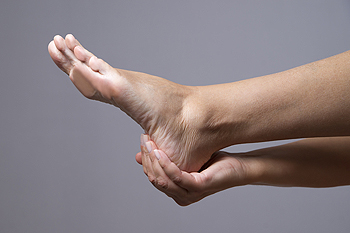 Foot pain can be a very debilitating condition to experience. First, however, it is important to figure out what is causing it. Plantar fasciitis is one of the most common causes of heel pain. Standing for long periods of time and overuse can cause the plantar fascia to become inflamed. Plantar fasciitis can affect anyone. Thankfully there are a number of treatments available for heel pain, with many of them being very easy to do. Keeping pressure off the feet, resting, and avoiding overuse can improve the condition of many who suffer from plantar fasciitis. Another method for treating heel pain includes buying a new pair of well-fitted shoes. Look for a pair that is not too tight or loose for your feet. Shoes should also have enough space in the toe box for your toes to wiggle around. Finally, look for a pair that is comfortable and that would be fine to wear for long periods of time. If you have heel or general foot pain that will not go away, see a podiatrist for a diagnosis and proper treatment.
Foot pain can be a very debilitating condition to experience. First, however, it is important to figure out what is causing it. Plantar fasciitis is one of the most common causes of heel pain. Standing for long periods of time and overuse can cause the plantar fascia to become inflamed. Plantar fasciitis can affect anyone. Thankfully there are a number of treatments available for heel pain, with many of them being very easy to do. Keeping pressure off the feet, resting, and avoiding overuse can improve the condition of many who suffer from plantar fasciitis. Another method for treating heel pain includes buying a new pair of well-fitted shoes. Look for a pair that is not too tight or loose for your feet. Shoes should also have enough space in the toe box for your toes to wiggle around. Finally, look for a pair that is comfortable and that would be fine to wear for long periods of time. If you have heel or general foot pain that will not go away, see a podiatrist for a diagnosis and proper treatment.
Many people suffer from bouts of heel pain. For more information, contact Dr. Kevin Davis of Davis Foot & Ankle Centers. Our doctor can provide the care you need to keep you pain-free and on your feet.
Causes of Heel Pain
Heel pain is often associated with plantar fasciitis. The plantar fascia is a band of tissues that extends along the bottom of the foot. A rip or tear in this ligament can cause inflammation of the tissue.
Achilles tendonitis is another cause of heel pain. Inflammation of the Achilles tendon will cause pain from fractures and muscle tearing. Lack of flexibility is also another symptom.
Heel spurs are another cause of pain. When the tissues of the plantar fascia undergo a great deal of stress, it can lead to ligament separation from the heel bone, causing heel spurs.
Why Might Heel Pain Occur?
- Wearing ill-fitting shoes
- Wearing non-supportive shoes
- Weight change
- Excessive running
Treatments
Heel pain should be treated as soon as possible for immediate results. Keeping your feet in a stress-free environment will help. If you suffer from Achilles tendonitis or plantar fasciitis, applying ice will reduce the swelling. Stretching before an exercise like running will help the muscles. Using all these tips will help make heel pain a condition of the past.
If you have any questions please contact one of our offices located in Springfield, and White House, TN, . We offer the newest diagnostic and treatment technologies for all your foot and ankle needs.
Read more about Heel PainCommon Conditions That Afflict the Foot
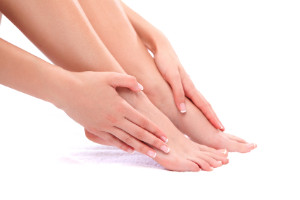 Our feet are an important part of our bodies and require good care to keep us going. Here are some common foot ailments and ways to treat them. A bunion, or the misalignment of the big toe, can be worsened by improper footwear, such as high heels or poorly fitted shoes. To prevent this, wear well-fitted and supportive shoes that provide ample toe space. Calluses and corns are caused by repeated friction on an area, which results in the buildup of hard skin. Preventing friction is the best way to stop both, so wearing quality socks and shoes that don’t rub up against the skin are best. If you do develop calluses or corns, it is recommended to see a podiatrist. Sometimes, viruses can enter the skin on our feet through tiny cuts or scrapes and cause verrucas, or plantar warts. Plantar warts are contagious, so it is recommended to see a podiatrist who can treat them. If you use public showers, wear shower shoes to prevent catching viruses and fungal infections, such as athlete’s foot. Ingrown toenails can occur if pressure is put on the nail or if the nails are cut too short. Athlete’s foot and fungal nails are both caused by fungi. While there are over-the-counter ointments that you can buy, podiatrists can prescribe better options. Finally flat feet, which are caused by fallen arches, can be taken care of with custom-made orthotics from a podiatrist.
Our feet are an important part of our bodies and require good care to keep us going. Here are some common foot ailments and ways to treat them. A bunion, or the misalignment of the big toe, can be worsened by improper footwear, such as high heels or poorly fitted shoes. To prevent this, wear well-fitted and supportive shoes that provide ample toe space. Calluses and corns are caused by repeated friction on an area, which results in the buildup of hard skin. Preventing friction is the best way to stop both, so wearing quality socks and shoes that don’t rub up against the skin are best. If you do develop calluses or corns, it is recommended to see a podiatrist. Sometimes, viruses can enter the skin on our feet through tiny cuts or scrapes and cause verrucas, or plantar warts. Plantar warts are contagious, so it is recommended to see a podiatrist who can treat them. If you use public showers, wear shower shoes to prevent catching viruses and fungal infections, such as athlete’s foot. Ingrown toenails can occur if pressure is put on the nail or if the nails are cut too short. Athlete’s foot and fungal nails are both caused by fungi. While there are over-the-counter ointments that you can buy, podiatrists can prescribe better options. Finally flat feet, which are caused by fallen arches, can be taken care of with custom-made orthotics from a podiatrist.
Everyday foot care is very important to prevent infection and other foot ailments. If you need your feet checked, contact Dr. Kevin Davis from Davis Foot & Ankle Centers. Our doctor can provide the care you need to keep you pain-free and on your feet.
Everyday Foot Care
Often, people take care of their bodies, face and hair more so than they do for their feet. But the feet are a very important aspect of our bodies, and one that we should pay more attention to. Without our feet, we would not be able to perform most daily tasks.
It is best to check your feet regularly to make sure there are no new bruises or cuts that you may not have noticed before. For dry feet, moisturizer can easily be a remedy and can be applied as often as necessary to the affected areas. Wearing shoes that fit well can also help you maintain good foot health, as well as making it easier to walk and do daily activities without the stress or pain of ill-fitting shoes, high heels, or even flip flops. Wearing clean socks with closed shoes is important to ensure that sweat and bacteria do not accumulate within the shoe. Clean socks help to prevent Athlete’s foot, fungi problems, bad odors, and can absorb sweat.
If you have any questions please feel free to contact one of our offices located in Springfield, and White House, TN, . We offer the newest diagnostic and treatment technologies for all your foot and ankle needs.
Read more about Every Day Foot CareAvoiding Running Injuries
 Avoiding injuries when running is important and can make your running experience more enjoyable. For new runners, start slowly and avoid pushing yourself too hard; the key is to gradually build yourself up. Before and after a run, stretch to loosen muscles and prevent strain. Strength training can also build muscle and durability; just be sure to rest one day before running or training again. A sign that you may be pushing yourself too much is if you cannot talk in complete sentences when running; if so, you may want to slow down. Keeping a good diet to replace lost calories and vitamins, hydrating plenty, and getting enough sleep will keep your body from quickly getting fatigued. If you do feel pain, stop running. If the pain resides in your feet, take it easy and rest. If the pain doesn’t go away, you may want to see a podiatrist for a diagnosis.
Avoiding injuries when running is important and can make your running experience more enjoyable. For new runners, start slowly and avoid pushing yourself too hard; the key is to gradually build yourself up. Before and after a run, stretch to loosen muscles and prevent strain. Strength training can also build muscle and durability; just be sure to rest one day before running or training again. A sign that you may be pushing yourself too much is if you cannot talk in complete sentences when running; if so, you may want to slow down. Keeping a good diet to replace lost calories and vitamins, hydrating plenty, and getting enough sleep will keep your body from quickly getting fatigued. If you do feel pain, stop running. If the pain resides in your feet, take it easy and rest. If the pain doesn’t go away, you may want to see a podiatrist for a diagnosis.
Exercising your feet regularly with the proper foot wear is a great way to prevent injuries. If you have any concerns about your feet, contact Dr. Kevin Davis of Davis Foot & Ankle Centers. Our doctor will treat your foot and ankle needs.
How to Prevent Running Injuries
Many common running injuries are caused by overuse and overtraining. When the back of the kneecap starts wearing out and starts causing pain in your knee, this is commonly referred to as runner’s knee. Runner’s knee is a decrease in strength in your quadriceps and can occur if you’re not wearing properly fitted or supporting shoes. To prevent runner’s knee, focusing on hip strengthening is a good idea, as well as strengthening your quads to keep the kneecaps aligned.
What Are Some Causes of Running Injuries?
- One cause of a common running injury is called iliotibial band syndrome.
- Plantar fasciitis is also another common injury.
- Stress fractures can occur from overtraining, lack of calcium, or even your running style.
Best Ways to Prevent Running Injuries
- Wear footwear that fits properly and suits your running needs.
- Running shoes are the only protective gear that runners have to safeguard them from injury.
- Make a training schedule. Adding strengthening exercises as well as regular stretching can help keep you strong and limber and can lessen the possibility of injuries.
- Stretching keeps muscles limber; this will help you gain better flexibility.
If you have any questions please feel free to contact one of our offices located in Springfield, and White House, TN, . We offer the newest diagnostic and treatment technologies for all your foot and ankle needs.
Read more about How to Prevent Running InjuriesHow to Prevent Stress Fractures
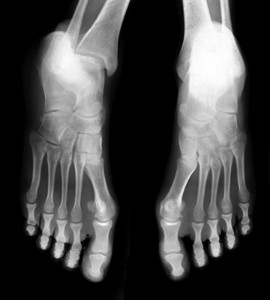 Stress fractures are small cracks in the bone typically caused by repetitive force or stress. While they can occur in various areas of the body, stress fractures are more likely to occur in the foot due to it having to bear weight and having to sustain repeated strikes. They can be very painful and often take time to properly heal. To avoid dealing with stress fractures, practice methods to prevent them from occurring. If you are starting a new physical activity, prevent stress fractures by taking it slowly and gradually increasing intensity and duration. This prevents overuse and allows your body to acclimate to physical stress. Footwear that provides proper support can improve your running style and prevent stress fractures. The surfaces you run on can also affect your risk for injury. Soft surfaces like grass can be more forgiving than harder surfaces like concrete. If you have questions about stress fractures and whether running is right for you, ask a podiatrist.
Stress fractures are small cracks in the bone typically caused by repetitive force or stress. While they can occur in various areas of the body, stress fractures are more likely to occur in the foot due to it having to bear weight and having to sustain repeated strikes. They can be very painful and often take time to properly heal. To avoid dealing with stress fractures, practice methods to prevent them from occurring. If you are starting a new physical activity, prevent stress fractures by taking it slowly and gradually increasing intensity and duration. This prevents overuse and allows your body to acclimate to physical stress. Footwear that provides proper support can improve your running style and prevent stress fractures. The surfaces you run on can also affect your risk for injury. Soft surfaces like grass can be more forgiving than harder surfaces like concrete. If you have questions about stress fractures and whether running is right for you, ask a podiatrist.
Activities where too much pressure is put on the feet can cause stress fractures. To learn more, contact Dr. Kevin Davis from Davis Foot & Ankle Centers. Our doctor can provide the care you need to keep your pain free and on your feet.
Dealing with Stress Fractures of the Foot and Ankle
Stress fractures occur in the foot and ankle when muscles in these areas weaken from too much or too little use. The feet and ankles then lose support when walking or running from the impact of the ground. Since there is no protection, the bones receive the full impact of each step. Stress on the feet can cause cracks to form in the bones, thus creating stress fractures.
What Are Stress Fractures?
Stress fractures occur frequently in individuals whose daily activities cause great impact on the feet and ankles. Stress factors are most common among:
- Runners
- People affected with Osteoporosis
- Tennis or basketball players
- Gymnasts
- High impact workouts
Symptoms
Pain from the fractures occur in the area of the fractures and can be constant or intermittent. It will often cause sharp or dull pain with swelling and tenderness. Engaging in any kind of activity which involves high impact will aggravate pain.
If you have any questions please feel free to contact one of our offices located in Springfield, and White House, TN, . We offer the newest diagnostic and treatment technologies for all your foot and ankle needs.
Read more about Dealing with Stress Fractures of the Foot and AnkleAre Shoe Sizes Keeping Up With Women’s Increasing Sizes?
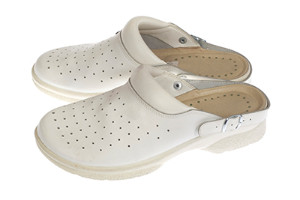 Women’s feet have increased two sizes since the 1970s, and yet their shoe sizes haven’t. Women who have larger feet are, unfortunately, left out and have few options. Some girls have resorted to wearing boys’ shoes, which are not properly fitted for women; this can lead to an increase risk of falling and other issues. Several experts blame this on overseas production and it not being cost-effective to make bigger shoes. Bigger shoes cost more to make; however, they are accounting for larger percentages in the footwear market. A few experts recommend buying from German companies, who have kept up with foot size increases. It is important that not only women, but also men, wear properly fitted shoes. Shoes that are too small can lead to issues like plantar fasciitis, corns, hammertoes, and a number of ailments that cause foot pain.
Women’s feet have increased two sizes since the 1970s, and yet their shoe sizes haven’t. Women who have larger feet are, unfortunately, left out and have few options. Some girls have resorted to wearing boys’ shoes, which are not properly fitted for women; this can lead to an increase risk of falling and other issues. Several experts blame this on overseas production and it not being cost-effective to make bigger shoes. Bigger shoes cost more to make; however, they are accounting for larger percentages in the footwear market. A few experts recommend buying from German companies, who have kept up with foot size increases. It is important that not only women, but also men, wear properly fitted shoes. Shoes that are too small can lead to issues like plantar fasciitis, corns, hammertoes, and a number of ailments that cause foot pain.
Getting the right shoe size is an important part of proper foot health. Seek the assistance of Dr. Kevin Davis from Davis Foot & Ankle Centers. Our doctor will provide the care you need to keep you pain-free and on your feet.
Getting the Right Shoe Size
There are many people who wear shoes that are the incorrect size, negatively affecting their feet and posture. Selecting the right shoes is not a difficult process, so long as you keep several things in mind when it comes to choosing the right pair.
- When visiting the shoe store, use the tools available to measure your foot.
- Be sure there is ‘wiggle room’. There should be about an inch between your toes and the tip of your shoes.
- Do not always assume you are the same size, as manufacturers run differently.
- Purchase shoes later in the day, as your feet swell as the day progresses.
- If a shoe is not comfortable, it is not suitable. Most shoes can’t be ‘broken in’, and comfort should be the ultimate goal when it comes to choosing the right pair of shoes
As our feet hold our body weight and keep us moving, it is important to treat them right. Picking the right pair of shoes can provide your feet comfort and mobility without pain.
If you have any questions, please feel free to contact one of our offices located in Springfield, and White House, TN, . We offer the newest diagnostic and treatment technologies for all your foot care needs.
Read more about Getting the Right Shoe Size: To Keep Your Feet HappyWhy Diabetics Should Be Cautious With Their Feet
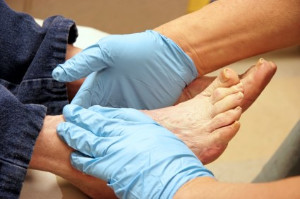 It is estimated that approximately one third of people with diabetes will develop a diabetic foot ulcer. History has shown that diabetics are more likely to have problems and complications related to their feet than others. This is largely to due the fact that the disease raises blood sugar levels, which decreases both sensation and circulation. According to experts, people with diabetes are far less likely to feel pain in their feet. Furthermore, it has been found that 40% of diabetics who develop ulcers will experience some sort of recurrence within a year.
It is estimated that approximately one third of people with diabetes will develop a diabetic foot ulcer. History has shown that diabetics are more likely to have problems and complications related to their feet than others. This is largely to due the fact that the disease raises blood sugar levels, which decreases both sensation and circulation. According to experts, people with diabetes are far less likely to feel pain in their feet. Furthermore, it has been found that 40% of diabetics who develop ulcers will experience some sort of recurrence within a year.
Diabetic foot care is important in preventing foot ailments such as ulcers. If you are suffering from diabetes or have any other concerns about your feet, contact Dr. Kevin Davis from Davis Foot & Ankle Centers. Our doctor can provide the care you need to keep you pain-free and on your feet.
Diabetic Foot Care
Diabetes affects millions of people every year. The condition can damage blood vessels in many parts of the body, especially the feet. Because of this, taking care of your feet is essential if you have diabetes, and having a podiatrist help monitor your foot health is highly recommended.
The Importance of Caring for Your Feet
- Routinely inspect your feet for bruises or sores.
- Wear socks that fit your feet comfortably.
- Wear comfortable shoes that provide adequate support.
Patients with diabetes should have their doctor monitor their blood levels, as blood sugar levels play such a huge role in diabetic care. Monitoring these levels on a regular basis is highly advised.
It is always best to inform your healthcare professional of any concerns you may have regarding your feet, especially for diabetic patients. Early treatment and routine foot examinations are keys to maintaining proper health, especially because severe complications can arise if proper treatment is not applied.
If you have any questions please feel free to contact one of our offices located in Springfield, and White House, TN, . We offer the newest diagnostic and treatment technologies for all your foot and ankle needs.
Read more about How to Care for Diabetic FootThe Most Common Foot Ailments for the Summer
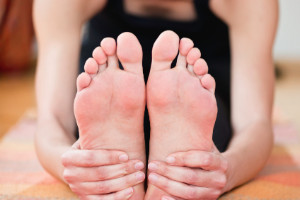 Foot problems tend to be more prevalent during the summer, and certain conditions pop up more than others. The most common foot problems for the summer are heel pain, corns, calluses, and blisters. Heel pain is usually the result of an inflamed plantar fascia, which is the long band of connective tissue that runs from the heel to the toes. Heel pain is often experienced by people who have flat feet and can be helped by offering added support in footwear. A couple of other foot issues people are faced with during the summer months are corns, calluses, and blisters. In order to prevent developing them, you should make sure you are wearing shoes that fit properly and have a lot of padding.
Foot problems tend to be more prevalent during the summer, and certain conditions pop up more than others. The most common foot problems for the summer are heel pain, corns, calluses, and blisters. Heel pain is usually the result of an inflamed plantar fascia, which is the long band of connective tissue that runs from the heel to the toes. Heel pain is often experienced by people who have flat feet and can be helped by offering added support in footwear. A couple of other foot issues people are faced with during the summer months are corns, calluses, and blisters. In order to prevent developing them, you should make sure you are wearing shoes that fit properly and have a lot of padding.
Everyday foot care is very important to prevent infection and other foot ailments. If you need your feet checked, contact Dr. Kevin Davis from Davis Foot & Ankle Centers. Our doctor can provide the care you need to keep you pain-free and on your feet.
Everyday Foot Care
Often, people take care of their bodies, face and hair more so than they do for their feet. But the feet are a very important aspect of our bodies, and one that we should pay more attention to. Without our feet, we would not be able to perform most daily tasks.
It is best to check your feet regularly to make sure there are no new bruises or cuts that you may not have noticed before. For dry feet, moisturizer can easily be a remedy and can be applied as often as necessary to the affected areas. Wearing shoes that fit well can also help you maintain good foot health, as well as making it easier to walk and do daily activities without the stress or pain of ill-fitting shoes, high heels, or even flip flops. Wearing clean socks with closed shoes is important to ensure that sweat and bacteria do not accumulate within the shoe. Clean socks help to prevent Athlete’s foot, fungi problems, bad odors, and can absorb sweat.
If you have any questions please feel free to contact one of our offices located in Springfield, and White House, TN, . We offer the newest diagnostic and treatment technologies for all your foot and ankle needs.
Read more about Every Day Foot Care